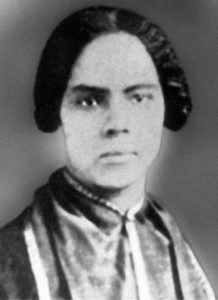
Mary Ann Shadd
*Mary Ann Shadd Cary was born on this date in 1823. She was a Black educator and administrator.
From Wilmington, Delaware, she was the eldest of 13 children of free Black parents; her father, Abraham Shadd, was an abolitionist. She received an education from the Pennsylvania Quakers. Cary devoted the first part of her life to abolition, working with fugitive slaves. In 1853, she became the first Black woman in North America to edit a weekly newspaper, the Provincial Freeman, devoted to displaced Americans living in Canada. She then became a teacher, establishing or teaching in schools for Negroes in Wilmington; West Chester, PA; New York; Morristown, NJ; and Canada. She was also the first woman to speak at a national Black convention.
During the American Civil War, Cary helped recruit Black soldiers for the Union Army. In Washington, D.C., she established a school for Black children. She began her second career, attending Howard University Law School, and became one of the first Black female lawyers in the United States when she graduated in 1870.
She fought alongside Susan B. Anthony and Elizabeth Cady Stanton for women's suffrage, testifying before the Judiciary Committee of the House of Representatives. As a lawyer, she worked for the right to vote and was one of the few women to receive the right to vote in federal elections. In 1880, she organized the Colored Women's Progressive Franchise, dedicated to women's rights.
As an educator, abolitionist, editor, attorney, and feminist, she dedicated her life to improving the quality of life for everyone: Black, white, female, and male.
The Face of Our Past:
Images of Black Women from Colonial America to the Present
Edited by Kathleen Thompson and Hilary Mac Austin
Copyright1999, Indiana University Press
ISBN 0-253-336535-X